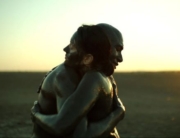Bostonian blueblood Cam Stuart is charming, manly, and easy on the eyes. He cooks great meals, builds cool gadgets, and bursts into verbal sorties that delight and amuse. Cam is also bipolar. His warm and fuzzy appeal is apt to take a scary turn into screaming, pots-and-pans-hurling rage. How Cam’s wife and daughters cope with this high-drama handful of a man is the central storyline of Maya Forbes’s Infinitely Polar Bear, a film with warmth and heart to spare in spite of its flaws.
One weakness happens to be one of the movie’s strengths, and that’s the lead performance of Mark Ruffalo as the unpredictable Cam. Ruffalo throws heart and soul into a big, extravagant role. He’s vital, affecting, and almost too loveable as a dangerous character. Ruffalo snaps and rages, but we are never afraid that he’ll completely turn on his family—or us. Real mental illness means heartbreak, fear, and isolation for the afflicted and those around them. Here it comes off a little sugarcoated.
Perhaps a soft touch comes naturally to director Forbes, who is telling her own parents’ story with this autobiographical film. Her family, surviving on rich relatives’ meager charity after Forbes’s father lost his job, looked for a way out of poverty. Her African-American mother decided to go to business school and was forced to leave her children in the care of their bipolar father. A tough choice for all involved, requiring patience, forbearance, and a lot of crossed fingers.
The film’s unfolds episodically as seasons change, decisions are made, setbacks take place, and reunions unfold (or don’t). Texture and sharply observed little moments help fill out a structure that can feel thin. Infinitely Polar Bear is a strong showcase for its other actors besides Ruffalo, and that helps pick up the slack. Zoe Saldana may be a little too chipper and polished as mom Maggie, but Ashley Aufderheide and Imogene Wolodarsky (Forbes’s real-life daughter) are endearing and convincing as two very different sisters thrust into a situation that may drive them closer than they want to be.
Many films strive to create a sense of place, or pretend to, but this one hits New England right on the nose with its glimpses of wealthy tightwads, old-school brokerage houses, and restaurants where interlopers are forced to don a jacket and tie. Production design and costuming recreate a dowdily comfy pre-Internet world of faded interiors and sturdy American-made preppy clothing that looks like late-1970s Boston all the way. (The film was actually shot in Providence, RI.) A soundtrack more soulful and upbeat than the usual listless indie fare adds spring to the movie’s step.
Forbes has made her debut film with love—maybe too much love. Let’s see if her sharp eye and generous handling of actors take her somewhere a little more risky next time.






Leave A Comment